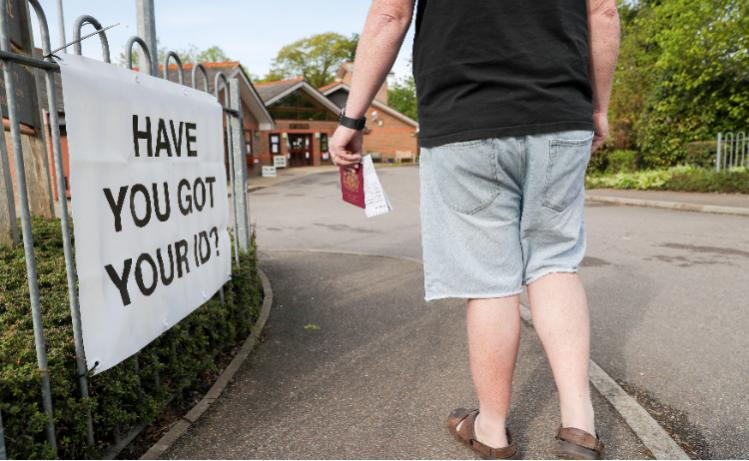Government Warned Changing Voting Systems Without Scrutiny Sets A “Dangerous Precedent”
Campaigners have criticised the lack of pre-legislative scrutiny for the Elections Bill (Alamy)
5 min read
Exclusive: Multiple campaign groups have fiercely criticised the government for including a major change to the voting system in an amendment to the Elections Bill, warning that the changes are being “rushed through without consultation”.
Under new changes to the Bill — added at the committee stage last month — elections for metro mayors and police and crime commissioners in England and Wales would revert to the First Past the Post (FPTP) voting system, rather than the current supplementary voting system.
Dr Jess Garland, Director of Policy and Research at the Electoral Reform Society (ERS), told PoliticsHome that amending voting systems in this way set a “very dangerous precedent by rushing these sweeping constitutional changes through with minimal scrutiny”.
She continued: “Most of this bill received no pre-legislative scrutiny, in contrast to legislation such as the Online Harms Bill.
“There has been no formal public consultation on the bill as a whole, and ministers are ignoring the recent Committee on Standards in Public Life report and the principle that governments should consult on big constitutional changes.
“Devolved governments are clear that they have not been properly engaged with, and they are right to be holding ministers to account on this.
“We urge ministers to pause and rethink this legislation and allow time for real public consultation and proper scrutiny of the proposals. We need electoral law to protect our elections not fiddle with the rules of the game”.
Her sentiments have been echoed by several other pro-democracy groups. Klina Jordan, co-founder and chief executive of Make Votes Matter, called the changes a “thinly-disguised power-grab” which was “designed to weaken the little democracy that we do have”.
“After the official consultation period for the bill ended, the Government inserted a last-minute instruction to change the voting system for mayors and police and crime commissioners to (FPTP), an undemocratic system which would be less representative of voters' wishes,” she told PoliticsHome.
“But people were not made aware of an opportunity to respond to the instruction. The process calls to mind tricks of tin-pot dictators — can a consultation be called a consultation when no-one knows about it?”
Kyle Taylor, director of Fair Vote UK, accused the government of moving forward with the changes too fast.
"While it is absolutely correct that we need new legislation to update our election laws in the face of new and emerging threats, it's becoming increasingly clear this is no way to go about it,” he said.
“No pre-legislative scrutiny, no consultation with devolved governments and new sections added after publication. It's time to pause and rethink this bill. Let's get it right, not do it quickly. Democracy depends on it." Tom Brake, director of Unlock Democracy, said the case for pausing the Bill to allow for better scrutiny was now “unassailable” as changes were being made with “indecent haste”.
Tom Brake, director of Unlock Democracy, said the case for pausing the Bill to allow for better scrutiny was now “unassailable” as changes were being made with “indecent haste”.
Critics of the Bill have also raised concerns about other aspects it addresses, including the introduction of voter ID at polling stations, changes to how postal and overseas votes are registered, and reform of the electoral commission.
Last month, former Cabinet minister David Davis criticised the government’s “dangerous” voter ID plans, claiming there isn’t enough evidence of voter fraud to justify them.
“Despite the spin, it’s clear that the true aim of this Bill is to silence critics, cripple opposition and rig future elections for those already in government,” said Naomi Smith, CEO of Best for Britain.
“In a move straight out of the authoritarian handbook, it takes powers away from the independent watchdog and hands them to Ministers, meaning they’ll be responsible for marking their own homework. MPs from all political persuasions who believe in democratic accountability should oppose this Bill.”
In England and Wales, the majority of metro mayors and police and crime commissioners are elected via the supplementary vote system, which allows voters to select both a first and second preference.
If the candidate with the most votes does not get more than 50% of the total votes, the second preference choices are taken into account, meaning that the “loser” could win once all votes are considered.
However, critics of the system claim it is confusing and can lead to voters inadvertently spoiling their ballot by filling it in incorrectly.
Following the 2021 local elections, a record 114,000 first preference votes were rejected in the London mayoral race, accounting for around 5% of the vote, with many blaming the fact that an unprecedented 20 candidates were on the ballot sheet.
Under changes added to the Elections Bill at the committee stage last month, elections for metro mayors, the Greater London Authority mayor, elected council mayors across England, and police and crime commissioners across England and Wales will operate under the FPTP system from 2023.
A government spokesperson defended the parliamentary process surrounding the Elections Bill, and said it was undergoing rigorous scrutiny.
"Our democracy is precious and the bill will protect it further by strengthening the integrity of our elections, increasing transparency, fairness and accountability; providing more protection for candidates and voters; and making our polls more inclusive," they said.
"We are continuing to work constructively with charities and civil society organisations to help people understand these changes and make sure that everyone who is eligible to vote will be supported to do so."
